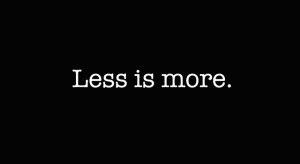
Many new daytraders experience at the start of their career that they are prone to trading too often on a daily basis.
It’s a classic issue, which almost always means losing money on your daytrading.
Perhaps you have done everything that is recommended. You have selected one market to trade, chosen 1-2 strategies, back-tested tested strategies, live-tested the strategies, kept a trading journal etc. But it still goes wrong.
You are now sitting with your ready-to-go method and start trading with real money in the market. But for the first couple of hours, nothing really happens and suddenly there is a setup that is almost ok. You probably need just a few individual details, but as you prefer not to miss a huge win, you jump in the market … and lose.
Now you are well annoyed by yourself because you did not comply with your rules, and then the evil spiral begins. You are now sitting and scolding on yourself, which does not help much if you want to take correct, systematic and well thought out trades.
Is it a bad idea to have many daily trades?
No, it’s not necessarily bad. It is not that simple. It all depends on one’s method, statistics, back-tests, etc.
If you have found a method that generates 50 trades a day in DAX with good historical profit and you are disciplined enough to follow the rules, then it’s not bad at all. Obviously, there are trading costs, but if your back- and live-tests show you have a so-called edge over the market, then trade it.
But for the new daytrader, such a scalping strategy with many small trades rarely is the optimal. Here, the number of trades should be cut slightly, which in turn must be of high quality.
So, what can we do about the problem?
I myself have used several small methods that helped me trade with more discipline.
Here are four concrete tips that have helped me a lot.
1. Write down your trading strategy prior to your daytrading
First and foremost, it’s important that you have written down exactly what it takes to go in and out of the market in the form of the following:
- Entry criteria (when do I enter a trade)
- Exit criteria (when will I exit a trade)
- Risk management (stop-loss)
- The size of each trade
- Etc.
All this should be considered in detail prior to your daytrading.
It may sound a bit boring and stringent, but to quote an old proverb, it’s also true that:
Failing to plan is planning to fail
2. Limit the number of trades per day
Decide on a certain number of trades that you are allowed to do during the day. Start with a low number at the start and gradually increase from this starting point. Put a specific limitation on yourself so that you can do maximum 3 daily trades for the next 2-3 weeks for example.
If you usually take 20 trades a day, this will require you to consider all the trades scarcely thoroughly to make sure you do not trade in one of your mere three.
It’s not because you always adhere to this limitation. But for a while it may be a nice little trick to force your brain to consider the quality of all your trades before you press the button.

3. Review today’s trades every night
Every single day, when I finish trading, I sit down and review the market minute by minute. I do this for both DAX and DOW.
I then replay the market forward for one minute at a time and note what I should have done.
When I finish this after about 30 minutes, I compare it to my real daytrading and see what I did in a different way. It’s some of the best education you can get. These 30 minutes have given me infinite insight into my own mistakes and deficiencies.
Besides this, it is often here that I get ideas for optimizing my strategies and maybe finding out new.
Do not skip this important step.
4. Get yourself a trading partner
I would strongly recommend that you find a like-minded trading partner that you trust and where it is entirely permissible to admit that you have made mistakes.
This trading partner must then have a copy of your trading rules in writing. Once a week, every other week, or maybe once a month, you will have to give your partner a list of your trades that will be reviewed. Now your partner is completely objective and evaluates your actions based on your own rules, and notes down where you have not followed them.
For many, this is highly cross-border, but it is crazily educational. At the same time, it forces you to every time you make a trade considering whether this trade can withstand a critical look from your trading partner…
It works!

So, all in all, there is not much rocket science in disciplining your daytrading, but it is a very important piece in the jigsaw puzzle, which in turn results in long-term profit for a daytrader.
We also recommend you to read the article about psychology in daytrading.